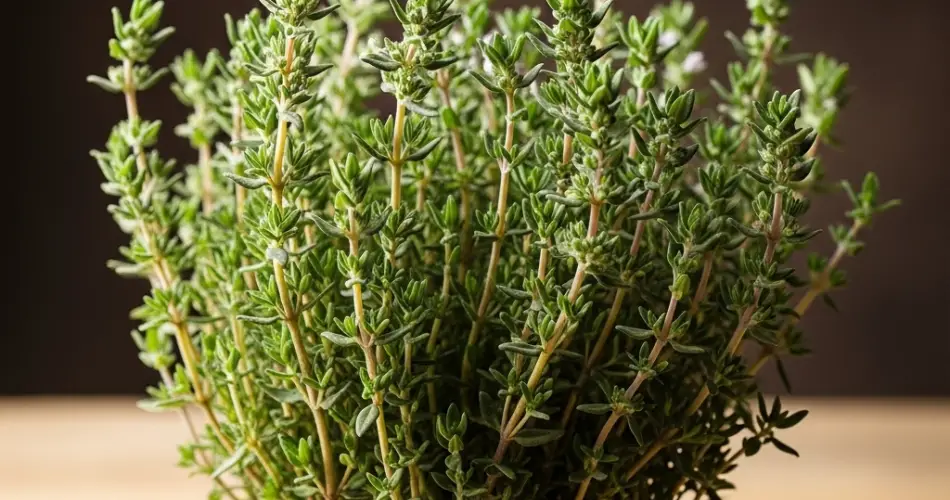Thyme (Thymus vulgaris) is a fragrant, hardy herb that has been valued for centuries, both in the kitchen and in traditional medicine. It is one of the most versatile and beneficial plants you can grow in your garden, offering culinary, medicinal, and ecological advantages. Whether you are a seasoned gardener or a beginner, adding thyme to your garden is a smart choice for enhancing flavor, health, and garden vitality.
What Is Thyme?
Thyme is a low-growing perennial herb native to the Mediterranean region. It belongs to the mint family (Lamiaceae) and is characterized by small, aromatic leaves and tiny purple, pink, or white flowers that attract pollinators like bees and butterflies. Thyme thrives in sunny locations with well-drained soil and is known for its drought tolerance and ease of cultivation.
Culinary Uses of Thyme
Thyme is widely used as a culinary herb around the world, prized for its warm, earthy flavor with subtle minty and lemony notes. It complements a variety of dishes, including:
-
Roasted meats and poultry
-
Soups and stews
-
Vegetable dishes
-
Sauces and marinades
-
Bread and cheese recipes
Fresh or dried thyme leaves can be added during cooking or used as a garnish. Growing your own thyme guarantees fresh, flavorful herbs at your fingertips.
Health Benefits and Medicinal Properties
Beyond its culinary uses, thyme is rich in beneficial compounds that have been traditionally used for health purposes:
-
Antimicrobial and Antifungal Properties
Thyme contains thymol, an essential oil known for its ability to fight bacteria and fungi. It can help combat infections, making thyme a popular ingredient in natural remedies for respiratory and digestive ailments. -
Respiratory Health
Thyme tea or inhalation of thyme steam is often used to relieve coughs, bronchitis, and congestion. Its expectorant properties help clear mucus and soothe irritated airways. -
Digestive Aid
Thyme stimulates digestion by promoting the production of digestive enzymes. It may help relieve indigestion, bloating, and gas. -
Anti-inflammatory Effects
Some studies suggest thyme may reduce inflammation and support immune function, aiding overall wellness. -
Rich in Antioxidants
Thyme is a good source of vitamins A and C, both antioxidants that protect cells from damage caused by free radicals.
Growing Thyme in Your Garden
Thyme is easy to grow and maintain, making it a perfect addition to any garden, patio, or herb container.
-
Soil: Thyme prefers well-draining soil with a neutral to slightly alkaline pH.
-
Sunlight: It needs at least 6 hours of direct sunlight daily.
-
Watering: Thyme is drought-tolerant; water only when the soil is dry.
-
Spacing: Plant thyme 20-30 cm (8-12 inches) apart to allow air circulation.
-
Propagation: Thyme can be propagated from seeds, cuttings, or division.
Ecological Benefits
In addition to its uses for humans, thyme supports a healthy garden ecosystem:
-
Attracts Pollinators: The small flowers of thyme attract bees, butterflies, and other pollinators essential for fruit and vegetable production.
-
Repels Pests: Thyme’s strong aroma can deter certain insect pests such as cabbage worms and flea beetles.
-
Ground Cover: Thyme spreads low to the ground and can be used as an attractive, fragrant ground cover that suppresses weeds.
How to Harvest and Store Thyme
Harvest thyme regularly to encourage bushier growth and prevent the plant from becoming woody. The best time to harvest is just before the plant flowers when the essential oil concentration is highest.
-
Snip the top 5–10 cm (2–4 inches) of stems.
-
Use fresh thyme immediately or dry it by hanging small bunches in a dark, airy place.
-
Store dried thyme in airtight containers away from light and heat.
Tips for Using Thyme
-
Add fresh thyme leaves to dishes during cooking to infuse flavor.
-
Use dried thyme sparingly as its flavor is more concentrated.
-
Brew thyme tea by steeping fresh or dried leaves in hot water for 5–10 minutes.
-
Create herbal infusions or homemade remedies with thyme oil or vinegar extracts.
Conclusion
Thyme is much more than a common herb; it is a powerhouse of culinary delight, medicinal benefits, and ecological advantages. Growing thyme in your garden enriches your cooking, supports your health, and promotes a balanced, thriving garden environment.
Whether you want to boost your meals with fresh herbs, explore natural health remedies, or attract beneficial insects to your garden, thyme is an essential plant to have on hand. Its ease of cultivation and wide range of benefits make it truly one of the most valuable plants you can grow.



